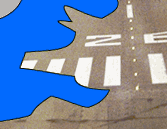 |  |  |
 |  |  |
 |  |  |
| by CHRISTOPHER MONTGOMERY | ||
July 8, 2002My Day at the Seaside Last week found me standing on a Sussex beach, lost in my own thoughts, staring out towards the channel and (presumably) France beyond. I had come, on a whim, onto the small village of Rottingdean, sometime home to Max Boot's hero, so as to be beside the sea after a trip to Lewes. Like all the beaches on that stretch of the South coast, this was a shingle one, irregularly punctuated with that characteristic man-made intervention of long promontories formed from large boulders heaped on top of one another. These snake out, like thin black tongues, from the shadow of the small, white cliffs above them, into the surprisingly brilliant and aquamarine water. With the tide coming in, waves were breaking over the rocky spit I had made my way out to the tip of, with each surge sending saltwater spitting angrily up through the gaps between the rocks. The relentless noise of the waves hissing past, crashing on the beach, then sucking the shingle back in a roar as they retreated out to sea again, reinforced many of the primitive notions of Toryism I have developed in the city. And now I propose to share them with you. But to do that, back to the past we will have to go. The sea was the end of a day's escape from London, to which the target had been the pretty Sussex town of Lewes. Winding medieval lanes promising you Anne of Cleeves' house at the foot of a hill, and chantry chapels being employed as private houses, several superb churches, one clearly using the Book of Common Prayer and a ruined castle overlooking a battlefield: little there then to upset the soul. A minor highlight was, after I went through the castle gatehouse towards the bailey and was pleasantly hemmed in by some Georgian barracks, the tortoiseshell who approached me, and made good with the sleek fluffiness. Subsequently I realised it wasn't simply my own animal charm that brought the cat near, but its desire to escape the 'ye olde tournament with jousting' that was being filmed in the former moat. Funnily enough, at the inn where I lunched, on my way from London to Lewes, yet another television company was at work, this time filming some scenes from a teen drama 'based around relationships'. Perhaps this is where the wealth of Southern England now comes from? What, if any one reason did, drew me to Lewes, was a chance to escape the price of second-hand books in London. Yet despite their fifteenth century premises, all too bookshops many were far too modern in that regard. In the end, I bought a book on the historiography of the American rebellion, largely because it had the bulk of the title of my own book within its own, and, for a pound a time, a dozen or so Encounters and Horizons, with the latter destined never to be read but always hereafter to be safely stored. Looking at the front cover of an Encounter from November, 1954 (#14), one appreciates that one lives in a diminished world. Yet, despite pondering on the employ of Dylan Thomas, Auden, Christopher Sykes, David Sylvester, Plum, etc., etc., in one edition, it was the name of the living that caught my eye. For there, bold as you like, was one of our five most famous Anglo-Belgians, Sir Peregrine Worsthorne. Or as he was then, the mere P. Worsthorne, 'a British journalist, associated with a leading London daily, who has spent considerable time in the United States'. To flesh that biography out just a bit, Perry is one of British journalism's grandest agents-provocateur. Of school, – Stowe – the twice married Worsthorne will today tease with claims of his attempted seduction by a fellow pupil, and now aged jazz musician. Of his ascent to reading history at Peterhouse under Maurice Cowling, he'll invariably preface anecdotes about there with the tale of his wartime service, where the gauche 2nd lieutenant cheerfully went about his business telling all and sundry the nature of the universe. During the Italian campaign, one particular brother officer seemed especially, unusually even, relaxed by this learned discourse, which only encouraged Worsthorne to ever more grandiloquent vapourings. Only afterwards did he learn that the quiet, older (as was so often the case during the war, when men of vastly differing ages found themselves enlisted at the same rank) man was Michael Oakeshott, who was little other than the country's foremost postwar philosopher. Later, Worsthorne was to rise to the editorship of the Sunday Telegraph, where, with the likes of Colin Welch, Cowling, Auberon Waugh and Peter Utley in his baggage train, he presided over an epicentre of Tory reaction, which in itself was more than anything an anarchic assault upon the modern world. And that bit of the story ends with him being sacked, soon after he bought the paper, by Conrad Black . To go back to the young Worsthorne, is to see a man making a pose, but a clever one, so clever in fact that it's worth reciting much of his article, nearly half a century old as it is. Although today pursuit of a tease against his peers has led Peregrine Worsthorne to strike out as a 'pro-European' ('all the better to be anti-democratic'), way back then his controversial mission was to explain why we, on this side of the Atlantic, should have more sympathy with the imperial mission Americans had found themselves landed with. Before we turn to his excellent and entertaining argument, I should perhaps point out my core difference with him, and I think the one he himself shares today. His essay was, I believe, wrong then as now to suppose that (US) politicians were bound hand and foot to popular opinion in matters of foreign policy. The sense of popular opinion – and the advent of opinion [sic] polls has in no way diminished this – is merely a claim, a weapon to be used in debate by competing political factions. More than in any other sphere, over foreign policy a people, in a democracy, do not, and cannot, direct the state. * * * What, from a Tory point of view, makes Worsthorne's words so enduringly truthful is that, although seeking perversity upon perversity through which to support Cold War America, he is not taken in by what any of us must see as the myths of the revolution. This is the case of a friend, and a clear sighted one, and is all the more damning for that, and for the persistence of its unappreciated relevance: When one considers [writes Worsthorne in 1954] objectively all the reasons for European anxiety about the United States, it soon becomes apparent that they cannot, in any rational way, account for the depth of anti-Americanism as it exists today. "McCarthyism", disagreements over China, nostalgia for the pax Britannica, a debtor's resentment – all of these are to some extent relevant, but even taken together, they do not add up to a valid explanation of that almost passionate feeling of resentment which provokes many Europeans, looking at the United States and the Soviet Union, to say "a plague on both your houses". A common solution to this riddle is to suggest that "we expect so much more" from the United States, which, although true, only raises the problem to another level. For what is this "so much more" that we expect from the United States – and are we justified in demanding it? [...] For some reason, Europe accepts the idea that America is a country with a difference, from whom it is reasonable to demand an exceptionally altruistic standard of behaviour; it feels perfectly justified in pouring obloquy on shortcomings from this ideal; and also, perhaps inevitably, it seems to enjoy every example of a fall from grace which contemporary America provides. Such a reaction, it may be argued, is inevitable among close friends, who always tend both to exaggerate each other's virtues and feel undue sorrow about each other's faults. But this only brings us back to the original query – why does Europe, in its relations with America, indulge in this quirk of friendship in a way which individual European countries, however close their links, would never think of emulating among themselves? [S]ome light may be thrown on the problem by considering the drastic transformation of the American role in the world since the end of the last war. Much has been written about the need for America to adjust itself to its new position as the unchallenged leader of an armed coalition facing a grave external threat. But little is ever written about the need for Europe to adjust itself to the new America that must perforce emerge from this American reappraisal. The adjustment called for is radical. Hitherto, despite the worse efforts of Dickens, Mrs Trollope, and Hollywood in caricaturing American social customs, the United States had retained its role, forged in 1776, as the political conscience of the democratic world. This role has all along been challenged by the intellectuals, and most particularly by American intellectuals themselves, who have been at pains to point out the difference between the American ideal and the American reality; but, as the ceaseless demand for free immigration suggests, millions of Europeans still regard America as both Eldorado and refuge. Since the Second World War, however, she has become the European shield instead of the European conscience. The two functions are mutually incompatible. The responsibilities of the United States for the defence of the free world inevitably tend to weaken her potency as the symbol and touchstone of political liberty [...] As Mr George Kennan has persuasively argued, the moralistic approach to foreign policy, necessary for the fulfilment of the conscience-role, is suicidal for a great power with world responsibilities. With painful anticipation (this, remember, is that unfortunate year for the French, 1954) Worsthorne uses US policy in Asia as a case in point, that her new responsibilities as a power were delimiting whatever moral suasion she had had previously. So much so that, 'America, more than Britain or France, is rapidly becoming the principal foreign devil in Asian eyes'. As the lesson that pounds on our skulls from this filleting reminds us time and time again: for America, and for those subject to her urges, things are going to get a lot worse. And this was there to be foreseen: 'the difficulties, however, are not only limited to America's relations with other countries. The attempt to combine the function of shield with that of conscience has also provoked alarming reactions within the United States itself'. Just wait, just wait – for as Worsthorne further observes, believing that America will never produce a tinpot Metternich of her own, 'with American cynicism as with her idealism, there would be no half-measures once the idea really caught on'. Imperceptibly, however, the facts of international relations have forced the United States to place more and more emphasis on her role as the arsenal, rather than the temple, of democracy. To live up to her commitments in defence of the Western World, she has undertaken an unprecedented military expenditure. he influence of the military mind has increased accordingly. At the same time, in order to strengthen the resolve of the population to shoulder the burden, the international situation has been dramatised into a conflict between absolutes – an ideological struggle with all its implications for national hysteria. This is the price in moral values which must be paid if the American shield is to be made effective. But having encouraged America to undertake the defence of the free world, it is intolerable and self-defeating to continue to measure her actions by standards only suitable for an earlier role. After dealing with the delusions of American history, conceding all national histories to be just so, Worsthorne proceeds to show why their maintenance, long after their time, has been so damaging. It's useful therefore to reflect on two of those he selects: that the consequence of the success of the Puritan plantation was too often a body politic where 'gradually they sought their standards in their own experience, making what they had accomplished the yardstick of what they ought to have accomplished'; and, moreover . . . That Burke and not Tom Paine was the real spokesman for the American Revolution in no way detracts from its glory, although it changes the emphasis. A country which arose from a legalistic concern to preserve old rights, rather than create new ones, cannot indulge in the conviction that in a few brief months in 1776 a miracle created a whole new polity, which no longer needed to be burdened by the traditional political ills of the old world. This idealised version of the Revolution and its principal spokesmen has resulted in subsequent American history being interpreted, not as a slow, halting attempt to reach a distant goal, but a gradual decline from a summit already scaled. 'But why has this American legend become so easily adopted outside the United States? [The] overestimate of the American achievement was the measure of the European failure. America in the last century became the favourite of the liberals in much the same way, and with as little real basis, as the USSR later became the hope of the 20th century "progressives".' Now that's an impressive little trope to wheel out; Worsthorne concludes by urging an illusion-free image of modern America on his readers, so that they might more clearly see why she is doing what she is doing. In this we should note that Sir Peregrine belongs to that obscure sect of conservatives who believe that the Cold War was something of a fraud. That the rhetoric which accompanied it had very little surface meaning, and next to no connection with diplomatic reality. In short, he was one of those who felt that the great thing about the Cold War was not the fact of resisting a laughable Soviet threat, but the domestic opportunity it afforded for bashing the liberal left with crypto-Commie smears. And he was right in that too – but for poor, poor America, he was one of her foreign friends urging empire upon her for selfish and native reasons, and not for the mystical reasons official, orthodox partisans of the Cold War would have you believe. * * * After Lewes, I went towards the sea, and by chance, Rottingdean, where Kipling had lived from 1897 to 1903, during perhaps the zenith of British imperialism. His house stands opposite a massively simple Norman church, which is faced on the other side of a small valley, by a gaunt, black windmill on the crest of a hill. St Margaret's has stood for a thousand years against the sea, and against falsity. In her graveyard lie an extraordinary range of mankind. From minor lady writers to random admirals, from Sir Charles Dilkes' son to a 'Canadian warrior', from Edward Burne-Jones to that rare thing, the grave of an RFC officer. Even on first seeing this wholly unintended scene, something tugged at the back of my memory, and as I went to leave, I glanced back one last time and saw the plain grave of Florence Carson, 'wife of Edward' – her husband having being buried in some state in the cathedral in Belfast. Which as much as Dwight Macdonald energetically giving an account of the Waldorf Conference in a 1949 Horizon, makes one contemplate the world we have left behind, and what we ought to make of it. The road back to London went through Brighton, and there the thing I valued most that was left still standing was the long ruin of the West Pier. When our civilisation is over and done with, that's the sort of relic I'd like to see us leave to the future. If the connection between a fantastical, empty and silently deafening structure doesn't immediately and completely drag you back to contemporary American foreign policy, allow me. American empire is not a 'natural state of affairs' which fell to her by default as Britain quit the stage. Nor even is it a trap, into which she was lured by the wily British as they departed. It is something that her leaders sought; upon finding that history had given them the opportunity, it is something they are now determined to keep. It is not for me to say what the American people make and made of this, but that's solely because, it's not for them to say either. |
| Text-only printable version of this article Recent Articles by Christopher Montgomery What
Are We Fighting For? Absent
Dangers: Forgotten 'Threats' Gibraltar:
It's Ours, And We're Keeping It Introducing
Ameroscepticism Your
Friends In the West Zimbabwe:
Whose Problem Is It Anyway? Terrorism,
at Home and Abroad Contact Christopher Montgomery Go to the most current column by Christopher Montgomery Sign up to receive Airstrip One by e-mail Christopher
Montgomery is an historian who is currently writing a book on the historiography
of the Suez crisis, and is publisher of ERO.
He recently took some time out to run the Iain Duncan Smith campaign office, and
for a while was working in the private office of the Leader of the Opposition.
A young representative of the diehard tradition, he believes that Enoch Powell
was right on everything apart from immigration. |
Please Support Antiwar.comSend contributions to: Antiwar.com or
Contribute Via our Secure Server |

